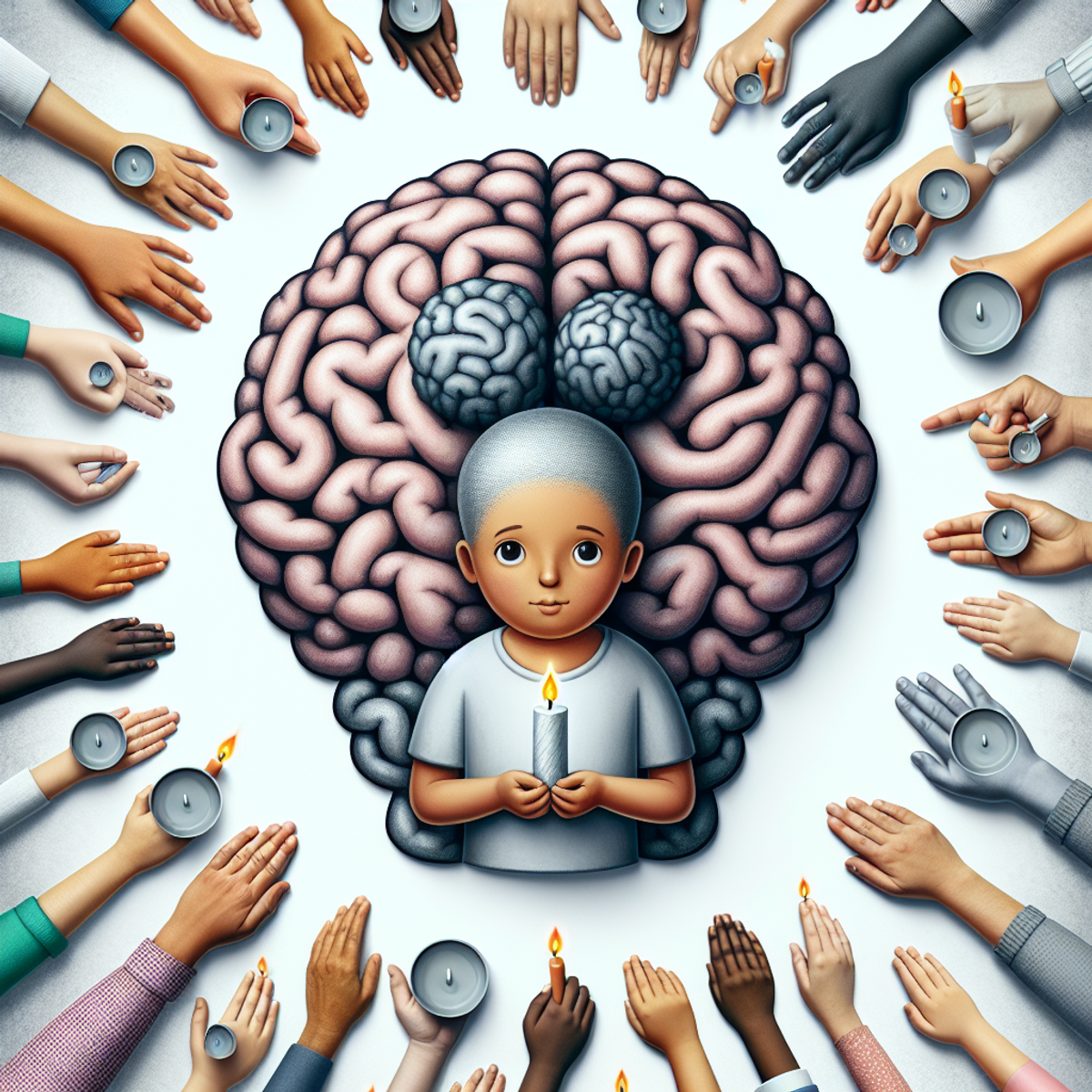Prominent media personality and former NFL player, Michael Strahan, recently shared a deeply personal announcement. His 19-year-old daughter Isabella was diagnosed with a brain tumor, a revelation that they made together on “Good Morning America”. This devastating news has cast a spotlight on the critical issue of pediatric brain tumors.
Isabella was diagnosed with medulloblastoma in late October. This unexpected news sent shockwaves through the family, thrusting them into an unfamiliar world of medical jargon, complex treatment plans, and emotional upheaval. The diagnosis has led to surgery and radiation for Isabella, who courageously faces the tough road to recovery.
The disclosure of Isabella’s diagnosis is a stark reminder of the importance of raising awareness about pediatric brain tumors. Despite their rarity, these tumors represent a significant health challenge for children and their families. Increased awareness can lead to earlier detection, better funding for research, and improved support for affected families.
Strahan’s public announcement serves two important purposes. First, it shows the strength of his daughter in facing this battle. Second, it underscores the need for increased attention towards pediatric brain tumors – diseases that often remain unknown until they affect someone close to us.
Understanding Medulloblastoma: A Rare Brain Tumor in Children
Isabella Strahan faced an unimaginable challenge when she was diagnosed with medulloblastoma, a rare type of brain cancer predominantly found in children, specifically between the ages of 5 to 9. This diagnosis is a stark reminder that serious health issues can arise at any age, even in the lives of those who seem invulnerable.
What is Medulloblastoma?
Medulloblastoma is characterized by its origin in the cerebellum or posterior fossa region of the brain. Despite its rarity, it presents telltale symptoms that often lead to its discovery:
- Persistent headaches
- Nausea and vomiting
- Coordination difficulties
- Vision changes
Timeline of Isabella’s Diagnosis Journey with Medulloblastoma
Isabella’s experience began with symptoms mistaken for vertigo until her condition escalated, leading to the emergency surgery necessary to remove the tumor. The swift action taken by medical professionals highlights the urgency and gravity of such a diagnosis.
The Crucial Role of Emergency Surgery
Removing the medulloblastoma surgically is often a pivotal first step in managing this cancer, acting as a foundation for subsequent treatments.
Key Takeaway: Treatment Success Through Multimodality Survival rates for medulloblastoma can be up to 75% when promptly addressed with a robust multimodal treatment plan encompassing:
- Surgery
- Radiation therapy
- Chemotherapy
Isabella’s Experience with Proton Therapy
Isabella underwent proton therapy, an advanced form of radiation treatment which targets cancer cells more precisely, potentially reducing damage to surrounding healthy tissue. Marking the end of her proton therapy sessions signified a significant milestone in her recovery journey.
Upcoming Challenges: Isabella’s Ongoing Battle and the Road to Recovery
The road ahead for Isabella involves further chemotherapy treatments, encapsulating the ongoing battle faced by individuals diagnosed with medulloblastoma. It underscores not only the complexity of treating this disease but also the resilience required during recovery.
This detailed understanding of medulloblastoma through Isabella’s lens provides invaluable insights into both the physical and emotional tolls of this condition and serves as a testament to the indomitable human spirit in facing life’s most profound challenges.
Supporting Michael Strahan Through Adversity: A Father’s Perspective on his Daughter’s Illness
When faced with adversity, it’s not uncommon to experience a shift in perspective. For Michael Strahan, renowned athlete and television personality, the diagnosis of his daughter Isabella’s brain tumor triggered such a transformation.
Putting Family First
Strahan took a personal leave from his duties at “Good Morning America” and “Fox NFL Sunday”, putting family first during challenging times. His absence, initially attributed to “personal family matters”, was later clarified when he and Isabella bravely shared her diagnosis with the world.
Embracing Vulnerability
The emotional impact of Isabella‘s illness compelled Strahan to reevaluate his strength and resilience. He acknowledged his vulnerability and expressed the need for support from others. This marked a significant departure from the tough-guy image often associated with him due to his athletic background.
“You learn that you’re probably not as strong as you thought you were when you have to really think about the real things,” he said on “Good Morning America.”
The Power of Love and Family
Balancing a demanding career while supporting a loved one through illness is an arduous journey. Yet, Strahan continues to navigate these difficult times with grace, demonstrating the enduring power of love and family.
Finding Meaning in Adversity
With his newfound perspective, Strahan’s experience underscores the importance of prioritizing family and personal well-being over professional commitments during crises. Such experiences often prompt individuals to reassess their values and priorities, leading to profound personal growth amidst adversity.
Shedding Light on Pediatric Brain Tumors: The Need for Increased Awareness and Research Funding
Why We Must Act Now: Understanding the Limited Treatment Options for Pediatric Brain Tumors
Pediatric brain tumors, like medulloblastoma experienced by Isabella Strahan, often pose a unique set of challenges. With limited treatment options primarily composed of surgery, radiation, and chemotherapy, it is crucial to understand the need for enhanced research and development in this area. The efficacy of current treatments varies greatly depending upon numerous factors including the tumor’s type and location, the child’s age, and the presence of metastatic disease.
Brain tumor awareness is therefore critical in attracting the necessary resources and funding needed to expand treatment options and improve patient outcomes. This includes not only research into more effective therapies but also early detection methods that can significantly impact survival rates.
Inspiring Stories of Survival and Hope
Despite the adversity presented by pediatric brain tumors, many families like the Strahan’s find strength in stories of survival and hope. These narratives spotlight individuals who have battled pediatric brain tumors and emerged victorious, providing much-needed inspiration to those currently facing these challenges.
A noteworthy example is Isabella herself. Following her diagnosis with medulloblastoma, she has undergone emergency surgery and radiation therapy with her sights firmly set on recovery. Her resilience serves as a beacon of light for other families navigating similar circumstances.
By amplifying advocacy efforts and sharing these inspiring stories, we can collectively help shift the future outlook for pediatric brain tumors from one of uncertainty to one filled with hope.
Conclusion
The journey of Michael Strahan and his daughter Isabella is a stark reminder of the challenges faced by those battling pediatric brain tumors. We can all play a part in this fight, by supporting organizations involved in research and providing assistance to affected families. Some of these notable organizations include St. Jude Children’s Research Hospital, The Pediatric Brain Tumor Foundation, and American Brain Tumor Association.
Supporting these organizations can manifest in various ways:
- Donating generously
- Volunteering your time and skills
- Raising awareness about the cause in your community
As we navigate this narrative, it becomes evident that celebrities like Strahan wield significant influence when raising public awareness about rare diseases. When public figures share personal stories like these, they humanize the issue, making it more relatable and moving for their audience. This ultimately drives collective action towards funding research, improving treatments, and supporting affected families.
Remember, each contribution—no matter how small—brings us one step closer to overcoming pediatric brain tumors. Let’s leverage the power of community to create a positive impact. Together, we can illuminate the path towards hope, recovery, and survival for many children like Isabella.


































































